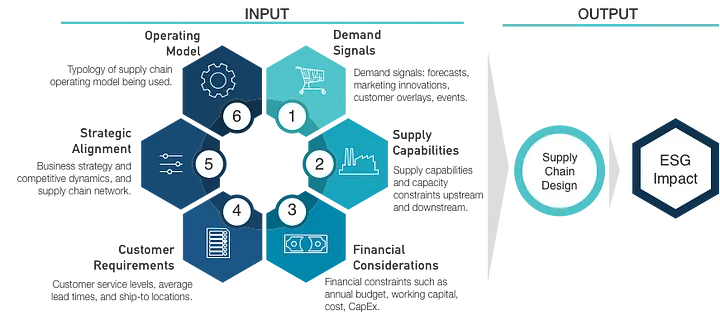While the term "supply chain operations" may evoke images of robots and warehouses, the reality is far more human-centered. Every step of the journey, from raw materials to finished product in the hands of a customer, involves individuals working together to create value.
However, the traditional emphasis on efficiency is undergoing a pivotal shift. In 2024, Environmental, Social, and Governance (ESG) factors are taking the lead in global supply chains. This change is driven by increasing demands from consumers, investors, and regulators for greater transparency and accountability. It signifies a departure from the historical focus on efficiency, signaling an evolution towards human-centric practices aligned with societal and environmental values.
This discussion will explore the role of ESG in modern supply chains and predict its path up to 2024. Moreover, we will analyse the benefits of incorporating ESG methodologies into supply chain management, along with suggested methods for implementing these strategies successfully.
The impact of each ESG aspect on supply chain planning
Integrating ESG principles into their supply chain strategies enables organizations to create supply chain operations that are mutually beneficial for the organization and society as a whole.
Environmental (E): Centres on an organization's environmental impact, addressing carbon emissions, energy consumption, waste management, and more. Supply chain planning involves strategies like reducing emissions, optimizing energy use, and promoting sustainable practices.
Social (S): Focuses on an organization's societal impact, including labor practices, diversity, and community engagement. In supply chain planning, priorities include fair labor practices, ethical sourcing, and initiatives for diversity and community engagement.
Governance (G): Concentrates on organizational structure and practices for transparency and ethical behaviour. Supply chain planning aligns with governance principles, establishing codes of conduct, implementing risk management, and engaging stakeholders in decision-making processes.
The state of ESG in supply chains today
As organizations increasingly prioritize sustainability, keeping tabs on the current state of ESG in supply chains is crucial. These criteria are gaining significance in how companies manage their supply chain operations, leading to the adoption of strategies aligning with these standards.
However, a hurdle is the challenge of accessing the data and analytics needed to assess ESG performance. Many companies face difficulties in data collection due to resource constraints or lack of expertise. Thankfully, there are now solutions for ESG Analytics from global sources, enabling firms to gain insights and manage operations effectively.
Explore more on Unlocking Sustainable Investments: The Power of ESG Data Analytics, Click here
Consumer attitudes play a significant role in shaping ESG goals within supply chains. The rise of social media platforms has empowered customers to express concerns about corporate responsibility and sustainability. This has prompted companies to aim for higher standards in ethical sourcing and reducing environmental impact throughout their supply chain routes.
Moreover, the COVID-19 pandemic has impacted ESG efforts in global supply chains. Businesses had to reassess their strategies as suppliers faced disruptions from travel restrictions, production delays due to lockdowns, or shifts in customer demand. Consequently, companies should focus on establishing resilient supply chains that can adapt swiftly during crises while maintaining cost efficiency.
Look how Polestar Solutions helped a leading player in the construction and building material industry reducing Scope 3 CO2 Emissions using automation, Explore full Case study
Shifting ESG to supply chain design

Source: Medium
ESG trends for Supply Chain in 2024
Navigating Evolving Laws:
As ESG risks intensify, global legislations like the U.S. Uyghur Forced Labor Prevention Act and the German Supply Chain Due Diligence Act demand compliance. Companies must adapt, stay informed, and use technology for compliance, seizing the opportunity to make a positive impact on society and the environment.
Investor Focus on ESG:
Investors increasingly use ESG principles to assess a company's commitment to sustainability beyond traditional financial metrics. Clear policies are essential for attracting investment.
Consumer Demand for Transparency:
Consumers now expect ethical standards across labor, human rights, and environmental practices. Companies must collect accurate data to prove adherence, avoiding reputational damage or boycotts.
Labor Practices Scrutiny:
Consumers demand assurance of fair labor practices throughout the supply chain. Companies need clear policies on acceptable conditions, even among suppliers and partners.
Green Technologies Adoption:
Green technologies, like solar power and blockchain, are gaining prominence. Companies are adopting these technologies for efficiency gains, cost savings, and a reduced environmental impact.
Rise of Responsible Sourcing:
Customers care about ethical sourcing, questioning products and processes. Companies must implement quality assurance and responsible sourcing initiatives to stay competitive.
In conclusion, adapting operations to specific ESG needs can yield significant rewards. Careful planning, meaningful strategies, accurate data gathering, and regular stakeholder engagement are crucial for staying competitive in the evolving landscape of 2024.
Want to more on ESG: Driving positive change in Finance & BFSI, Click here
Polestar solutions empower with data analytics services enable organizations to implement a robust, data-driven approach for ESG Analytics. This empowers businesses to achieve environmental, social, and governance (ESG) objectives, meeting the expectations of customers, employees, and investors.


No comments yet